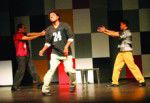Performance tackles racism

February 13, 2008
A standing-room-only crowd watched “N*gger Wetb*ck Ch*nk” (N*W*C), a three-person show aimed at engaging viewers with the issue of racism, last Friday evening in the Villanova Room.
Directed by Steven T. Seagle and Liesel Reinhart, the critically acclaimed show blends theatre, hip hop, stand-up comedy, slam poetry and true-life stories in an hour-and-a-half production with the expressed purpose of engaging the issue of racism, but without “the predictable anger and angst,” according to the group’s Web site.
“We chose this show because diversity is a big issue on Villanova’s campus, and we wanted to bring more awareness to the community as a whole,” said Siobhan D’Angelo, chairperson for CAT’s Ideas and Issues Committee. “There’s a very sheltered feeling on this campus that leads students to believe that these issues don’t affect them, when in reality these issues affect everyone.”
CAT and the Center for Multicultural Affairs co-sponsored the showing, which was free of charge. CMA staff first experienced the show in June 2007 at the National Conference on Racism and Ethnicity. As a diversity peer educator, SGA Vice President Dave Pedra was also present at the National Conference on Race and Ethnicity and immediately advocated for a showing at Villanova.
“It’s a really interesting way to reach people about a topic that is all too commonly glanced over,” Pedra said.
The show sparked conversation even before it began that evening, as many walking through Connelly Center caught sight of the wall-sized banner, with its provocative title, promoting the show.
“We had initially decided to change the title of the show for our campus,” D’Angelo said. “The show would not let us. In hindsight, that was the best thing the show could have done. I was in the Connelly Center for the hour before the performance, and it was interesting and eye-opening to hear what people were saying when they saw the banner.”
“I thought having the poster in Connelly was fantastic,” senior Jennifer Park said. “It allows students to look at it and wonder why it is there. Ignorance is one of the biggest problems that cause racism to continue.
To have a sign hang causes students to ask questions, leading to education about discrimination and racism.”
The show itself began with a beat-box chant exclusively using the three words of its title before launching into an etymology of each word.
“The opening scene definitely provided some shock value as to the performers level of comfort with the words, but immediately they kind of debriefed the show to the audience and let you in a little bit as to what they were hoping to accomplish,” Pedra said.
“The cancer is racism, and these words are the polyps,” said Dr. Teresa Nance, assistant vice president for Multicultural Affairs. “You can’t get rid of the cancer without dealing with the polyps.”
Following the cultural and linguistic history of each word, each of the show’s stars – Rafael Agustin, Allan Axibal and Miles Gregley – told a story of learning in childhood what it meant to be identified by race.
“There were a mix of reactions, from laughter to stone-cold looks,” junior Walter Smith-Randolph said. “Some people thought that racial issues should not be handled in a comedic way.”
After the show, Professors Carol Anthony, Rick Eckstein and Maghan Keita, as well as Karima Bouchenafa, associate director of the Honors Program, joined the actors for a panel discussion facilitated by co-writer Seagle.
“I was very proud of some of the answers from our own faculty, especially those from Karima and Dr. Keita,” Pedra said. “For us as a University to demonstrate to a group of performers who hear some of the more ignorant comments in response to their show that we are really trying to engage the students in a level of discourse which shapes the way they conceptualize the world and the context they both are from and live in is something special.”
“I was pleased with the many students who stayed after to dialogue about the show,” Nance said. “We’d like to call it guerilla education. It comes when you least expect it – on a Friday night in college.”
During the post-show dialogue, the actors told of a previous showing that brought one audience member to tears.
“He told us how he had cried only twice in his life,” Agustin said. “The first time was during ‘Titanic.’ The second was during the show, when he realized he was a racist, and that he wanted to work on moving beyond that.”
Among the most active participants in the post-show dialogue were the 25 high school students hosted by the Center for Multicultural Affairs as part of a program to engage a larger audience in the possibilities of higher education.
The students came from various communities in the Northeast.
“What impressed me was not only the ability of the actors to perform but to engage the audience with the issue,” Nance said. “We could not ask for more from the performers.”
Cast members Axibal and Gregley attended the next evening’s Heritage: The Third Annual Black Cultural Expo, hosted by Villanova’s Black Cultural Society.
When asked about Villanova’s recent progress with regard to diversity, Nance was quick to quote civil rights activist Fannie Lou Hamer.
“We’re not where we ought to be,” Nance said. “We’re not where we’re going to be, but I’m sure glad we’re not where we were.”
Tara Powers contributed additional reporting to this article.

